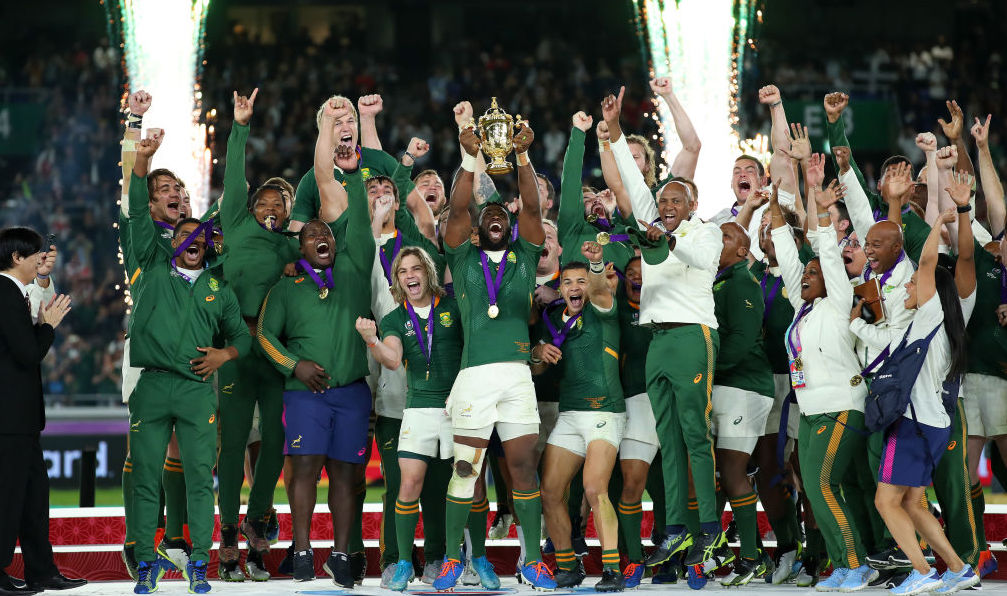It was Siya Kolisi’s destiny to lift the Webb Ellis cup. And no amount of shade by Mbuyiseni Ndlozi is going to change that, writes JOHN GOLIATH.
I believe in destiny. I really do. It comes from watching too many sports bio movies where people triumph against all the odds because their purpose transcends their circumstances. The bigger picture is what drives them to succeed.
WATCH: Kolisi’s moving speech in Cape Town
One of the first things I remembered when Siya Kolisi was appointed captain of the Springboks was that he was born on 16 June; one of the most tragic, yet significant days in the history of South Africa.
On 16 June 1976 the Apartheid police shot and killed hundreds of children and students who were protesting against the use of Afrikaans as a medium of instruction in schools. The day is now commemorated as Youth Day, to remember those who lost their lives because they wanted to be educated in their mother tongue.
For a headline writer it is an absolute dream that the first black man to do lead the Boks was born on that exact same day, albeit 15 years later. But it’s something Kolisi tried to downplay for most of the week leading up to that first against England at Ellis Park on 9 June.
He knew the significance of his appointment as Bok captain, he couldn’t really miss it, as he was asked that question everywhere he went that week. But, in his own understated way, he tried to not make the occasion about himself.
But that Test was about him. It was a truly significant day in South African sport. You could feel it in the stands. The roar when he led the team out onto the field. The way the WHOLE of Ellis Park belted out the national anthem. It was the stuff of goosebumps.
ALSO READ: Krige challenges Guscott’s view
Having covered many Bok matches over the last four years, you tend to just want to get the formalities out of the way. As a journalist you want the action to get going, because the build-up is normally the worst part of covering a Test match.
But this was different. The people who were there on that sunny, but chilly June day would tell you. There was just this indescribable feeling of patriotism that I haven’t felt in a very long time. The Boks had their first black captain and 50 000 people were behind him all the way. They ended up winning that first Test and, a week later on Kolisi’s birthday, clinched the series with a win in Bloemfontein.
That was the start of a journey that ended with the Boks winning the World Cup on 2 November 2019, which sparked wild celebrations from people from all walks of life. Kolisi fulfilled his destiny, going from a kid born into extreme poverty on 16 June 1991 to a man who has inspired kids from all walks of life to shoot their shot and follow their dreams.
DID YOU READ: Erasmus hails ‘selfless’ Brits
People such as Mbuyiseni Ndlozi and his fellow Economic Freedom Fighters has had a lot to say about ‘fake unity’ following the euphoria of the Boks’ win and subsequent trophy parade. In a sense he is right that the celebration is not going to miraculously heal a country still trying to fix itself after it was divided along racial lines for many, many decades. But he and the EFF is completely missing the point here.
How can the images we have seen over the last few weeks not inspire black kids in particular and give them the courage to follow their dreams and reach for the stars. How can we not be inspired about Kolisi’s story of a guy who had no other desire then to find something to eat as a kid.
We all know that dreams also don’t fill stomachs, but Kolisi is a bigger role model than Ndlozi will ever be.
The 34-year-old Ndlozi reaction is also in stark contrast to my dad’s joy and excitement after the World Cup final.
My 72-year-old father, who was part of the South African Council of Sport (Sacos) movement, was fighting Apartheid through sport long before Ndlozi was glint in his mother’s eye. The Sacos war cry was ‘no normal sport in an abnormal society’ is a code he still lives by.
He like many other Sacos stalwarts weren’t happy about the uneasy unity which was achieved in 1991/1992, when an all-white Proteas cricket team and an all-white Springbok team made their way back to international rugby. Many still support teams such as the All Blacks because of this.
But almost 30 years later my dad watched the Boks in a World Cup final wearing a Morne Steyn, No 10 Test jersey because of captain Kolisi. He watched a team from different cultures, led by a black captain simply blow England off the park. It was a moment that longed for and finally got to see.
So, tell me, how can a guy such as Ndlozi, who didn’t even get his hands dirty in the struggle against Apartheid, tell us what this World Cup win really means? Tell us how to feel? Tell us to ignore the fact that kids were crying when they saw their triumphant heroes during the trophy tour, and South Africans embracing each other
Ellis Park, 9 June 2018 was the start of something special. Something special that culminated into something spectacular almost 18 months later. Doctor Ndlozi is either too daft to see it or is just playing political games.
We really shouldn’t care, though. Siyamthanda Kolisi fulfilled his destiny and has cleared the path for other generations to follow in his footsteps. And, somewhere, those who gave up their lives for the struggle on 16 June 1976, will be looking on with a lot of pride.





